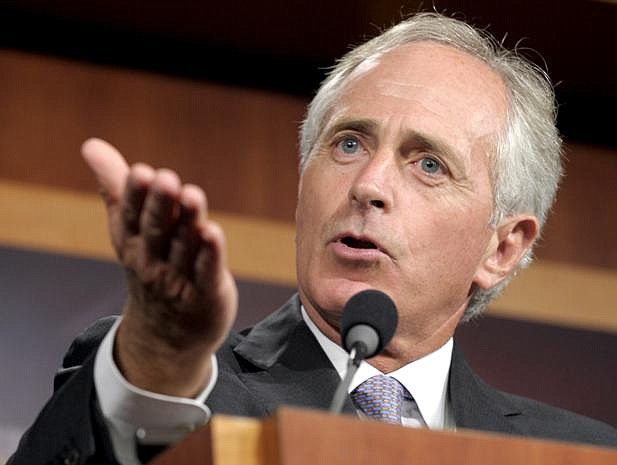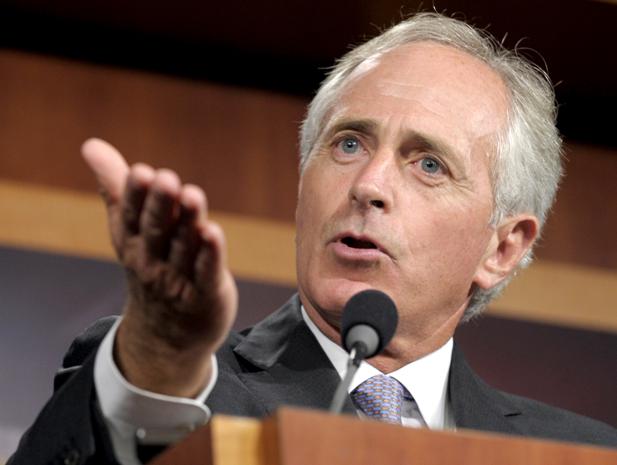U.S. Sen. Bob Corker's office charged Tuesday that a government watchdog group was trying to smear the Chattanooga Republican after the group filed complaints accusing the senator of possible insider trading.
The Campaign for Accountability filed the complaint Tuesday with both the U.S. Securities and Exchange Commission and Senate Ethics Committee by the Campaign for Accountability.
It says Corker, a former Chattanooga mayor, may have engaged in insider trading as well as making false statements on his Senate personal disclosure forms when trading shares in Chattanooga-based CBL & Associates Properties Inc., a real estate investment trust that owns and manages shopping malls.
A senior Banking Committee member as well as chairman of the Senate Foreign Relations Committee, Corker "made an astonishing 70 trades of stock in the real estate investment giant CBL and Associates Properties," CfA said in a news release announcing the complaint.
Basing many of its allegations on previous reporting in 2011 and just last week by The Wall Street Journal, the group said several of Corker's trades "closely preceded company announcements that led to changes in the stock's price and seemingly resulted in the senator making millions of dollars."
"Senator Corker's trades followed a consistent pattern - he bought low and sold high," said Anne Weismann, executive director of the Campaign for Accountability. "It beggars belief to suggest these trades - netting the senator and his family millions - were mere coincidences."
The senator's office fired back, saying Corker had done nothing wrong and the charges are politically motivated.
"These baseless accusations from a political special interest group are categorically false and nothing more than a smear campaign," said Tara DiJulio, a Corker spokeswoman, in a statement.
DiJulio said Corker, who as a developer and owner of commercial buildings made millions prior to his 2006 election to the Senate, "always has disclosed to the public that he invests in CBL since he first held stock in the company back in 2007."
Corker's early business career included working for a construction firm that did business with CBL. And CBL executives have contributed to his campaigns. They've also contributed to any number of other lawmakers.
DiJulio also said the accounting firm that worked on Corker's financial disclosure reports "properly listed the sale and gain or loss of transactions, but some did not list the day they were purchased, so after completing a full review, we are correcting this technical oversight."
The complaint follows last week's Wall Street Journal article which stated Corker had made dozens of profitable, often short-term trades in CBL shares. Forty-five trades were made for himself and the remaining 25 on behalf of his wife or trusts established for his two daughters.
The Journal said 12 trades were recently disclosed in amended reports after the newspaper began asking questions about inconsistencies. Some were among his most profitable transactions.
In one case, Corker bought between $1 million and $5 million in CBL in late 2011, the newspaper reported. Five months later, the senator sold them at a 42 percent gain, the Journal reported.
In 2009, two purchases of shares in accounts for his daughters probably resulted in a $1 million profit, the newspaper reported.
Corker made between $1 million and $5 million on CBL trades in both 2010 and 2012, according to the Journal. However, the newspaper said he could have lost money in other years. Senators are required to disclose annual profits, but not losses, on investments.
In 2011, the Journal published a story citing Corker's frequent trading in CBL. He said in a statement at the time that he had "watched the trading range on this hometown-based stock" and "found that especially during times of market volatility it trades within wide ranges."
He added: "I've bought it heavily when it is at the low end of that range and then I hold it until there is upward movement, when I sell."
CfA said Corker's share purchases were estimated at between $3 million to $15 million in 2010 shortly before UBS, his broker, upgraded its recommendations. After they shot up 18 percent, Corker started selling and, CfA said, a week later, UBS downgraded the stock and the share prices soon declined about 10 percent.
Corker's office said while the focus has been on UBS recommendations on share purchases, analysts at other firms were often saying hold or sell shares.
The disclosures are required under congressional rules and are intended to give the public knowledge about elected officials' financial investments. There are different categories and amounts are listed in broad ranges.
CfA charged in its news release that "as a member of the Senate Banking Committee [Corker] has advanced legislation that would financially benefit UBS and CBL. If Senator Corker's trades were based on material, nonpublic information he received from anyone with a fiduciary duty to CBL or UBS in return for any benefit, the senator may have engaged in insider trading.
"And," CfA added, "if the senator knowingly failed to report his CBL assets, he may have committed the crime of making false statements."
In a statement last week, Corker said he had done nothing wrong and blamed his accountants.
"I am extremely disappointed in the filing errors that were made in these earlier reports where the accounting firm mistakenly used realized gain/loss methodology instead of the Senate financial disclosure guidelines," he said. "Therefore, in a few cases, only the sale and gain or loss of the transaction was reported. As a result of this inquiry, and after completing a full review, we are correcting this oversight."
His office also said last week "the accounting firm that worked on his financial disclosure reports properly listed the sale and gain or loss of some transactions, but did not list the day they were purchased so after completing a full review, we are correcting this technical oversight."
David DiStefano, an accountant and partner at G.R. Rush & Co. PLLC who handled Corker's taxes many of the Senate filings, explained to the Times Free Press last week that "we have many of the tax documents that we have used in preparing his tax returns that include gain and loss statements from various brokerage firms."
He said "we would go through those reports and pick up all the sales of securities the best that we could and report purchases of securities, as well. But we didn't have a detailed transaction report from the brokers that showed every single transaction every month. There was a potential to miss one, and we certainly did."
The CfA said it uses research, litigation, and "aggressive communications to expose misconduct and malfeasance in public life and hold those who act at the expense of the public good accountable for their actions."
The group was formed as a nonprofit group in May, said spokesman Daniel Stevens in an interview. Weismann formerly worked at the watchdog group Citizens for Responsibility and Ethics in Washington.
A listing of Campaign for Accountability's leaders on its websites show several people with ties to Democrats. Its says one of them, Nick Hackworth, has over a decade of experience in all levels of political research. He served as director of strategic research for President Barack Obama's 2012 re-election campaign.
But Stevens said the group is nonpartisan. He pointed to the CfA's request that the House Office of Congressional Ethics investigate 11 members for possible criminal and ethics violations by accepting contributions from the payday lending industry shortly before or after taking official actions in support of the industry.
The list included two Democratic congressmen, according to a news release. Republicans included U.S. Rep. Stephen Fincher, R-Tenn.
Contact Andy Sher at asher@timesfreepress.com, 615-255-0550 or follow on twitter at AndySher1.

